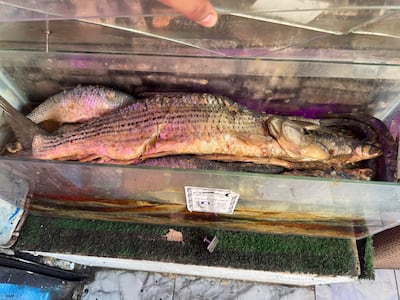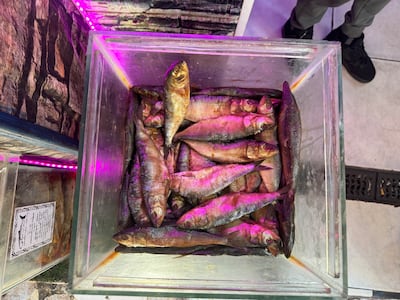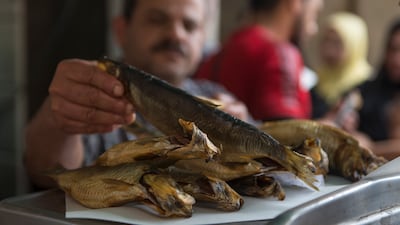Anyone walking through Cairo’s bustling streets during Eid Al Fitr will be unable to ignore the distinctive smell of one of the country’s most divisive dishes.
Fesikh, a dish of salted fish, has a long culinary history that goes back to the ancient Egyptians.
It is usually made with grey mullet, an affordable species of fish found abundantly in the Nile, and plays a role in religious customs practised by both Muslims and Coptic Christians.
For the country’s Muslims, it is usually consumed as a palate cleanser after Ramadan, when they fast until sundown.
“I find it very refreshing after Ramadan, because iftars are usually full of meat, chicken and a lot of other rich dishes, so eating the cold fesikh with generous amounts of spring onions and arugula is a welcome change,” said Ahmed Youssef, 38.
Mr Youssef lives in Cairo’s Shobra neighbourhood, where fish shops opened early on Thursday morning to meet the demands of the area’s locals. Some of them eat fesikh all three days of Eid.
As for Coptic Christians, fesikh is typically eaten on Easter to mark the end of the Great Lent, a 40-day fasting period when they stop eating all animal products. They likewise eat the dish as a palate cleanser.
However, Easter Monday is also when the Sham Ennessim national holiday is marked by Egypt’s Muslims and Copts alike. This year, it will be celebrated on May 6.
The holiday originates in ancient Egypt, when it was celebrated as the Shemu Festival that marked the coming of Spring and warmer weather.
Fesikh is eaten copiously by both groups during Sham Ennesim.
“We sell a lot during Eid and we plan ahead to ensure we have made enough as the process of preparing it takes just over two weeks,” explains Mohamed Essam, a fish seller in Shobra,
“But my highest sales are in Sham Ennessim when Copts end their fast and also buy it.”

One of the most characteristic elements of fesikh is the strong smell that it develops after being hung to dry for over two weeks in the sun as part of the curing process.
The smell, described by some as a stench, deters people who Mr Essam described as “sensitive eaters”.
“The smell is often a tell of how expertly the fesikh was prepared. If it is unbearable to the nose, it has been left out for too long where it has spoiled. The trick is to get it just before it spoils when the smell is nice and tangy,” he said.
Egyptians often squeeze copious amounts of lemon juice on the fish to combat its stench, before eating it with bread and various vegetables including radish, lettuce and arugula.
A less popular alternative to fesikh is salted herring, which, in addition to being much less fragrant as well as being twice as cheap, also rises in popularity during the same seasons. It is known in Egypt as ringa.
“Ringa is for people who can’t handle the smell of fesikh, it’s lighter, much less complex in flavour but still meets their demands for a refreshing, salty meal,” said Mr Essam.
Despite a sharp increase in price since last year, Mr Essam's sales of both fesikh and ringa have been similar this year, which he says is testimony to how essential the meal is for Egyptians.

While last year, a kilo of fesikh sold for 260 Egyptian pounds ($5.47), this year it has risen to 370 Egyptian pounds ($7.78).
Ringa on the other hand, increased in price from 70 pounds per kilo ($1.47) to 120 Egyptian pounds ($2.52).
For those who can’t afford to buy it in the store, however, fesikh is easily prepared at home. Many Egyptians have posted their attempts to prepare the dish on social media, as they seek to save money.
“I got a recipe from a YouTube video two years ago when things started to get really expensive. This is my second year to make it and I don’t know if I got lucky, but it worked out really well,” said Seham Sameh, 68, who lives in Hadayek El Qubba.
I was surprised because many of my neighbours weren’t able to get it right. It was either too stinky or too salty,” she told The National.
“When you make it at home, you can save over one hundred pounds, and we are trying to save every penny we can at the moment,” she explained.
Eid celebrations in Cairo were markedly muted this year and remained largely contained inside neighbourhoods where small fairs were erected and some shops hosted promotional events.
Many Egyptians trying to save money this year opted to not engage in many of the holiday’s popular practices due to the rising cost of living.
Eid Al Fitr ends on Friday, April 12.


